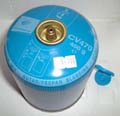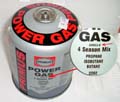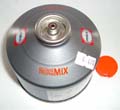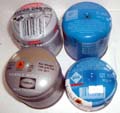|
Our work as a shopkeepers made us to learn a lot of things we never thought
about before. Like this gas cartridges flora. We still have a lot unlearned, but may be this article can help you - to
begin with.
Use internet - great information tool.
|
We know from expirience about 3 most used types of cartridges:
differencied by way of connection to cooking/ warming equipment. Most likely, you will get those in Iceland.
Have a proper look at your primus before you by gas.
It is NOT possible to use different types of cartrige for one primus - even if they look
quite the same -
on the first view.
- "Snapping" - "click" system: cartriges from "CAMPINGAZ ", usually not easy to get in Iceland
- we do have good quantity of them for this year. There is a small "nose" in the middle, cooking stove is firmly
set on it until it "clicks". Normally you can take the stove off untill you want to use it for the next time
and gas will not leak out, but always be careful!
- "Screwing" system - looks somehow the same but there is a real screw muster on the head, you will screw the stove
on it .This system also allows
you to take the cartrige off before it is fully used and reuse it again.
a. By "PRIMUS - POWER GAS" you have to pay attention to a small number as shown on the picture below: some cooking
equipments accept
only cartridges with number 1, some - only with number 2. It has something to do with the length of the needle which
transports gas up to the stove. We found it out through some experiments, but you can search information further by the
gas producers.
b. "PRIMUS " produces at least two different shapes of cartriges - they have not quite the same upper part "shoulders".
Usually it is not a problem, but still some cooking models can be unsuitable with one of those shapes.
- "Piercing" system doesn´t allow you to disconnect the cartridge from your stove before you finish all the
gas in it. A needle
makes a small hole in the tin and transports the gas from there. It is important to make a nice and round hole - so the gas
will not leak on the side. Sometimes people try to use 2 small cartridges ( 90gr) instead of 1 bigger (190gr).
SOMETIMES it works out nicely but sometimes tourist have got problems: empty cartridge, when you put it under the full one,
can still contain small amount of gas, which will be "hanging" under the bottom of the upper one and can explode
at any time. Not nice.
a. As you can see, they are not of the same shape and still there are cooking systems which will accept only blue models from
CAMPING GAZ with 4 (5?) small deep shapes on it´s side, and some other system which will only take round shaped cartridge.
|
 1. 1. 
|
|
1. "snapping" or "clicking" connection system. |
 2. 2.  2
A. 2
A.
|
 2A 2A
|
2. "screwing" connection. |
 3. 3.
|
|
3. "piercing" connection. |
| |
There are different kinds of the gas used in cartridges. Some mixtures are very sensible
to the cold weather: gas begins to be "lazy" sometimes already around 0°C. It is colder close to the earth where we usually place
our cookers.
Gas butane has the lowest weather resistens (boiling point around 0,5°C) that is why it is mixed with gas propane,
which has more tolerance to cold weather, and in other mixtures with isobutane - this one helps to make gas mixture more even.
Advice from expirienced tourists: warm you gas bottle before it will warm your food - keep it in your sleeping bag
while you are brushing teeth :), keep it for a while in your (icelandic) pulover.
|
|
| |
General rule says that to boil 1 liter of cold water takes 7 minutes by full
power of your small cooker. One full gas cartridge 450gr will burn for ca 3 hours on full power. It depends from gas
mixture, weather, cooking equipment. |
|
|





 2A
2A 3.
3.